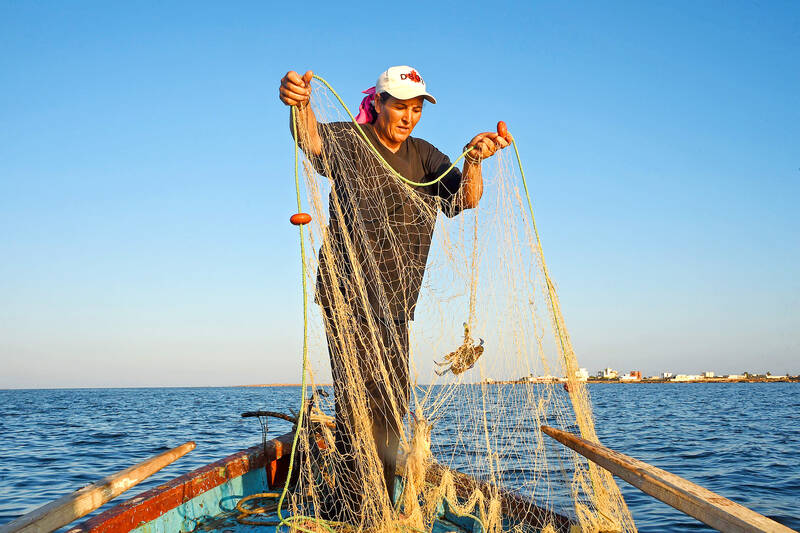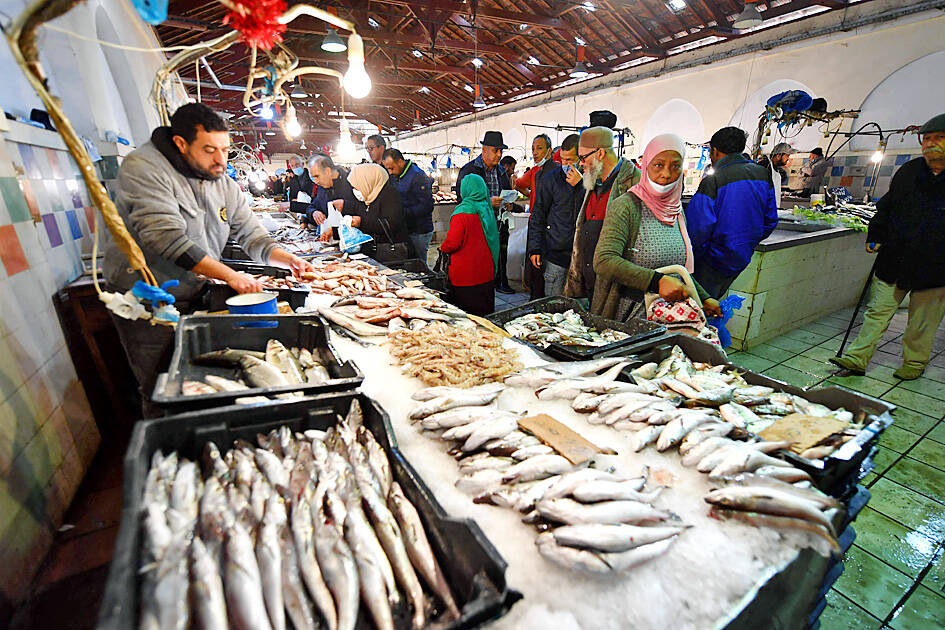Off a quiet Tunisian island, Sara Souissi readies her small fishing boat. As a woman in the male-dominated trade, she rows against entrenched patriarchy, but also environmental threats to her livelihood.
Souissi began fishing as a teenager in a family of fishers off their native Kerkennah Islands near the city of Sfax, defying men who believed she had no place at sea.
“Our society didn’t accept that a woman would fish,” she said, hauling a catch onto her turquoise boat.

Photo: AFP
“But I persisted, because I love fishing and I love the sea,” said Souissi, 43, who is married to a fisherman and is a mother of one.
A substantial portion of Tunisia is coastal or near the coast, making the sea an essential component of everyday life.
Seafood, a staple in Tunisian cuisine, is also a major export commodity for the North African country, with Italy, Spain and Malta the top buyers, and revenue nearing 900 million dinars (US$296.1 million) last year, official figures showed.

Photo: AFP
Tunisian women have long played a major role in this vital sector, but their work has been undervalued and unsupported, a recent Food and Agriculture Organization study found.
The study said that while women were actively involved throughout the fishing value chain, they remained “generally not considered as an actual worker” by their male counterparts.
Fisherwomen also have less access to administrative benefits, training and banking services, where they are viewed as “high-risk borrowers” compared with men, the study said.
As a result, many do not own their own boats, and those working with male relatives are “considered as family help and therefore not remunerated,” it added.
In Raoued, a coastal town on the edge of the capital, Tunis, the Tunisian Society for Sustainable Fishing launched a workshop in June for women’s integration into the trade.
However, most of the women attending the training said that they were only there to help male relatives.
“I want to help develop this field. Women can make fish nets,” participant Safa Ben Khalifa said.
There are no official numbers for fisherwomen in Tunisia.
Although Souissi is formally registered in her trade, many Tunisian women can work only under the table — the World Economic Forum said that 60 percent of workers in informal sectors are women.
“We want to create additional resources amid climate change, a decrease in marine resources and poor fishing practices,” said Ryma Moussaoui, the Raoued workshop coordinator.
Last month, the Mediterranean Sea reached its highest temperature on record at a daily median of 28.9°C, the Spanish Institute of Oceanography said.
Pollution and overfishing have compounded the strain on sea life and resources in countries such as Tunisia.
Rising temperatures make the waters uninhabitable for various species, while unsustainable fishing such as trawling or using plastic traps indiscriminately sweeps up dwindling sea life and exacerbates pollution.
“They don’t respect the rules,” Souissi said about fishers using those methods. “They catch anything they can, even off-season.”
In 2017 in Skhira, a port town on the Gulf of Gabes, 40 female clam collectors formed an association to enhance their income — only to see their hard-won gains later erased by pollution.
Before its formation, the women earned about one-10th of the clams’ final selling price in Europe, association president Houda Mansour said.
By cutting out “exploitative middlemen,” the association helped boost their earnings, she added.
However, in 2020, the government issued a ban on clam collecting due to a severe drop in shellfish populations, leaving the women unemployed.
“They don’t have diplomas and can’t do other jobs,” said Mansour, now a baker.
In hotter, polluted waters, clams struggle to build strong shells and survive. Industrial waste discharged into the Gulf of Gabes for decades has contributed to the problem.
It has also forced other species out, said Emna Benkahla, a fishing economics researcher at the University of Tunis El Manar.
“The water became an unfavorable environment for them to live and reproduce,” undermining fishers’ revenue, she said.
“Because they couldn’t fish anymore, some sold their boats to migrants looking to cross the Mediterranean illegally,” she added, calling for more sustainable practices.
Souissi, who only uses relatively small nets with no motor on her boat, said she and others should fish responsibly to survive.
“Otherwise, what else can I do?” she said, rowing her boat back to shore. “Staying at home and cleaning? No, I want to keep fishing.”

‘SWASTICAR’: Tesla CEO Elon Musk’s close association with Donald Trump has prompted opponents to brand him a ‘Nazi’ and resulted in a dramatic drop in sales Demonstrators descended on Tesla Inc dealerships across the US, and in Europe and Canada on Saturday to protest company chief Elon Musk, who has amassed extraordinary power as a top adviser to US President Donald Trump. Waving signs with messages such as “Musk is stealing our money” and “Reclaim our country,” the protests largely took place peacefully following fiery episodes of vandalism on Tesla vehicles, dealerships and other facilities in recent weeks that US officials have denounced as terrorism. Hundreds rallied on Saturday outside the Tesla dealership in Manhattan. Some blasted Musk, the world’s richest man, while others demanded the shuttering of his

ADVERSARIES: The new list includes 11 entities in China and one in Taiwan, which is a local branch of Chinese cloud computing firm Inspur Group The US added dozens of entities to a trade blacklist on Tuesday, the US Department of Commerce said, in part to disrupt Beijing’s artificial intelligence (AI) and advanced computing capabilities. The action affects 80 entities from countries including China, the United Arab Emirates and Iran, with the commerce department citing their “activities contrary to US national security and foreign policy.” Those added to the “entity list” are restricted from obtaining US items and technologies without government authorization. “We will not allow adversaries to exploit American technology to bolster their own militaries and threaten American lives,” US Secretary of Commerce Howard Lutnick said. The entities

Minister of Finance Chuang Tsui-yun (莊翠雲) yesterday told lawmakers that she “would not speculate,” but a “response plan” has been prepared in case Taiwan is targeted by US President Donald Trump’s reciprocal tariffs, which are to be announced on Wednesday next week. The Trump administration, including US Secretary of the Treasury Scott Bessent, has said that much of the proposed reciprocal tariffs would focus on the 15 countries that have the highest trade surpluses with the US. Bessent has referred to those countries as the “dirty 15,” but has not named them. Last year, Taiwan’s US$73.9 billion trade surplus with the US

Prices of gasoline and diesel products at domestic gas stations are to fall NT$0.2 and NT$0.1 per liter respectively this week, even though international crude oil prices rose last week, CPC Corp, Taiwan (台灣中油) and Formosa Petrochemical Corp (台塑石化) said yesterday. International crude oil prices continued rising last week, as the US Energy Information Administration reported a larger-than-expected drop in US commercial crude oil inventories, CPC said in a statement. Based on the company’s floating oil price formula, the cost of crude oil rose 2.38 percent last week from a week earlier, it said. News that US President Donald Trump plans a “secondary